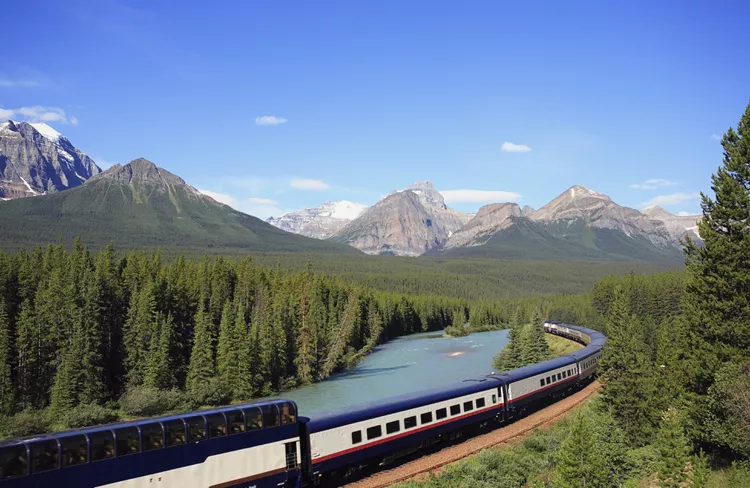Summary
Overview of Train Travel in Canada
Train travel is a comfortable, convenient, and relatively affordable way to get around Canada. However, visitors should acknowledge that the Canadian rail system does not possess the extensive reach, regularity, or overall convenience found in European rail services. Consequently, train travel can be relatively expensive in Canada, although prices are changing in more prominent corridors.
VIA Rail remains the sole major train operator in Canada. It provides service across the country from the eastern point of Halifax, Nova Scotia, to Vancouver, B.C., in the west. Primarily, it traverses the southern part of the nation, where the population is most concentrated, with occasional journeys further north. The busiest VIA Rail route is the Quebec to Windsor corridor, encompassing Montreal and Toronto.
Moreover, VIA does not operate in any of Canada’s three territories or the Atlantic provinces of Prince Edward Island or Newfoundland and Labrador.
VIA Rail offers both economy and VIA 1 (business class) sections. On long routes, sleeper cars enhance passenger comfort. VIA’s reputation among passengers is average, with frequent complaints regarding late trains and prolonged stops while waiting for freight trains with priority on the track. WiFi availability is often inconsistent.
Most metropolitan areas in Canada, such as Vancouver, Toronto, and Montreal, have commuter train networks that connect major cities to smaller, outlying towns, typically located one to two hours away.
In addition to VIA Rail and local commuter services, Canada hosts several operators catering to historic rail cars, novelty trains, and special scenic journeys, such as the Rocky Mountaineer along the West Coast.
Western Canada/Prairies: British Columbia, Alberta, Manitoba, Saskatchewan
:max_bytes(150000):strip_icc():format(webp)/a-via-rail-passenger-train-crossing-a-steel-tressel-in-the-foothills-of-alberta-canada--177806942-5b0819053418c60038d7ab5a.jpg)
The Canadian VIA Rail network may appear illogical at times; for instance, Calgary lacks a VIA Rail stop, despite being a significant hub for travelers visiting Alberta and British Columbia. Conversely, VIA Rail services rural communities with smaller populations, like Churchill. However, these routes are mandatory and subsidized by the government since year-round alternative transportation is unavailable. Many off-the-beaten-track destinations can provide enriching experiences for tourists, with Churchill, Manitoba, well-known for its polar bear population.
Key train routes across Canada’s West Coast and Prairies connect Edmonton, Jasper, and Vancouver, as well as Edmonton, Saskatoon, and Winnipeg.
The Jasper-Vancouver route offers an exceptional opportunity to bask in some breathtaking Rocky Mountain scenery. An overnight train featuring glass-domed passenger cars serves as a delightful Canadian excursion.
Translink facilitates regional train service linking Vancouver with adjacent municipalities.
Central Canada: Ontario and Quebec
:max_bytes(150000):strip_icc():format(webp)/canada--quebec-province--near-shawinigan--le-saguenay-train-on-montreal-jonquiere-railroad-line-stopping-everywhere-on-demand-163242380-5b0819e4119fa80037921852.jpg)
Ontario and Quebec host the most vibrant network of VIA Trains, notably the busy Quebec City-Winnipeg corridor, which features the heavily-trafficked route between Montreal and Toronto.
Popular VIA Rail destinations in Ontario include Kingston, Belleville, and Stratford, renowned for the Stratford Festival.
GO Transit provides commuter train services connecting Toronto with locations such as Niagara Falls, Hamilton, and Barrie. GO Trains operate regularly throughout the week and are supplemented by a network of buses servicing similar routes.
In Quebec, VIA Rail runs a scenic route along the Saint Lawrence River stretching from Montreal to the northeast Gaspe region.
Atlantic Canada: New Brunswick, Nova Scotia, Eastern Quebec
:max_bytes(150000):strip_icc():format(webp)/via-s-canadian--train--2--leaving-vancouver--126348566-5b081b9504d1cf003659eabe.jpg)
Traveling through the Maritimes (the Atlantic provinces of New Brunswick, Prince Edward Island, and Nova Scotia) is most commonly achieved by renting a car or joining a bus tour. Notably, train travel is limited in this region, as VIA Rail does not service PEI or Newfoundland and Labrador.
Nonetheless, VIA Rail operates a popular overnight train from Montreal to Halifax, featuring over 20 stops along the way.
Rocky Mountaineer
:max_bytes(150000):strip_icc():format(webp)/rocky-mountaineer-gold-leaf-dome-cars--514356961-5b0818668023b900362f9919.jpg)
Since 1990, the Rocky Mountaineer has transported passengers through some of Canada’s most stunning landscapes while continuously improving the standards of rail travel. Moreover, the Rocky Mountaineer goes beyond mere transportation by offering complete packages that include fine dining, deluxe accommodations, and two-level glass domed coaches with full-length windows, allowing passengers to immerse themselves in the breathtaking views of glacier-fed lakes, majestic mountains, and roaring rivers of Alberta and British Columbia.
Scenic, Novelty, and Heritage Trains
:max_bytes(150000):strip_icc():format(webp)/kettle-valley-steam-railway--summerland--british-columbia--canada--north-america-175840484-5b081c3aba61770036654b72.jpg)
Canada boasts a variety of heritage and novelty trains that emphasize the journey rather than merely transporting passengers from point A to point B.




